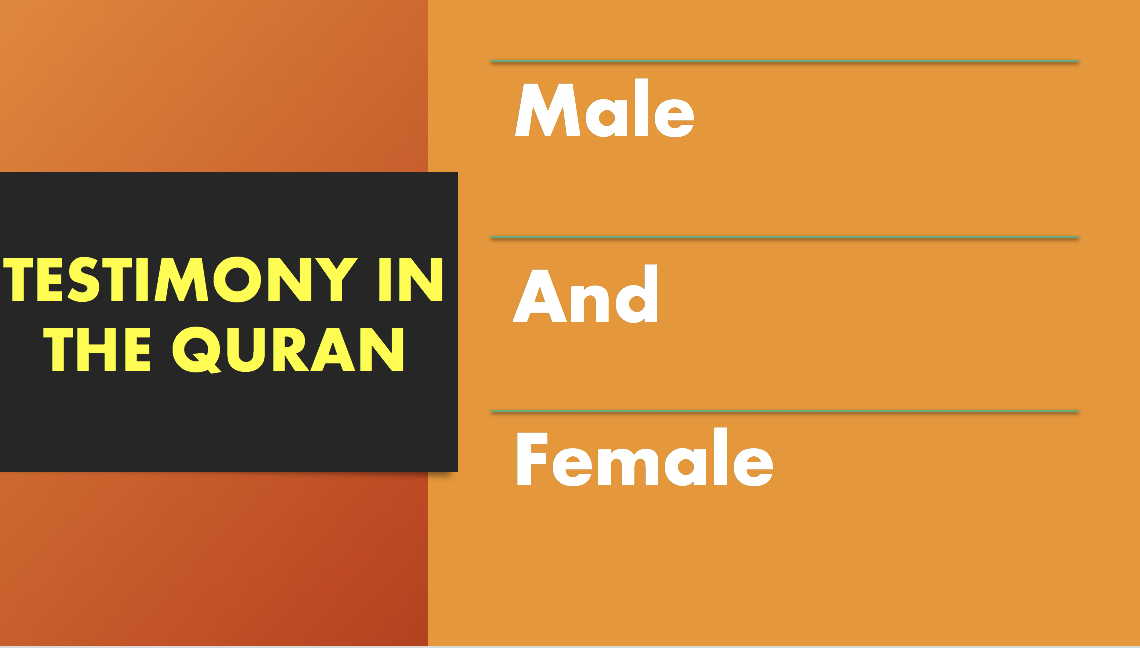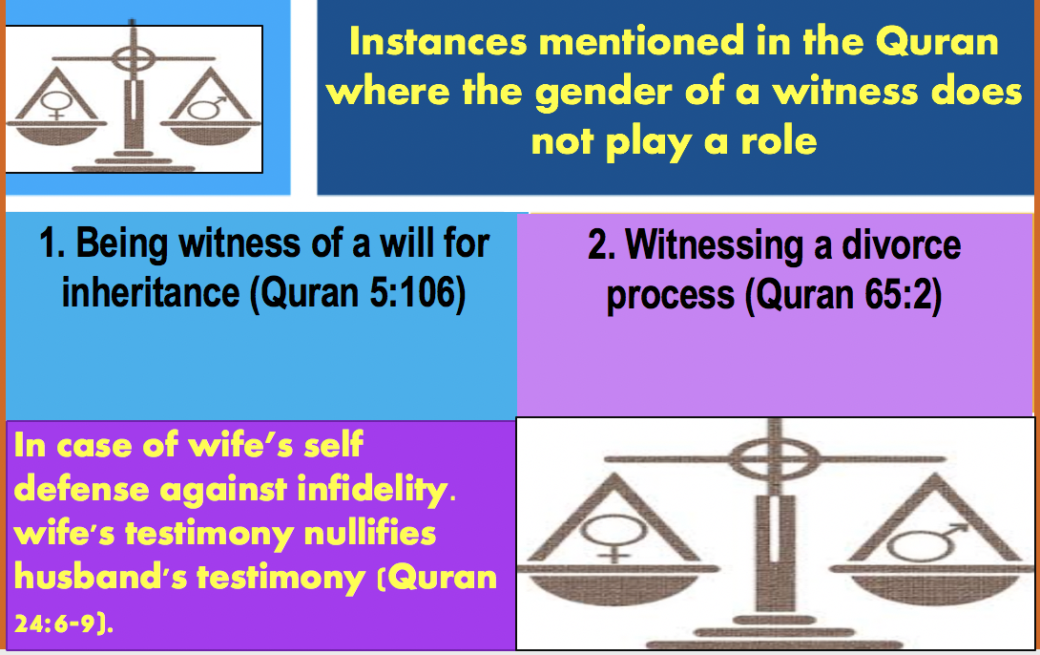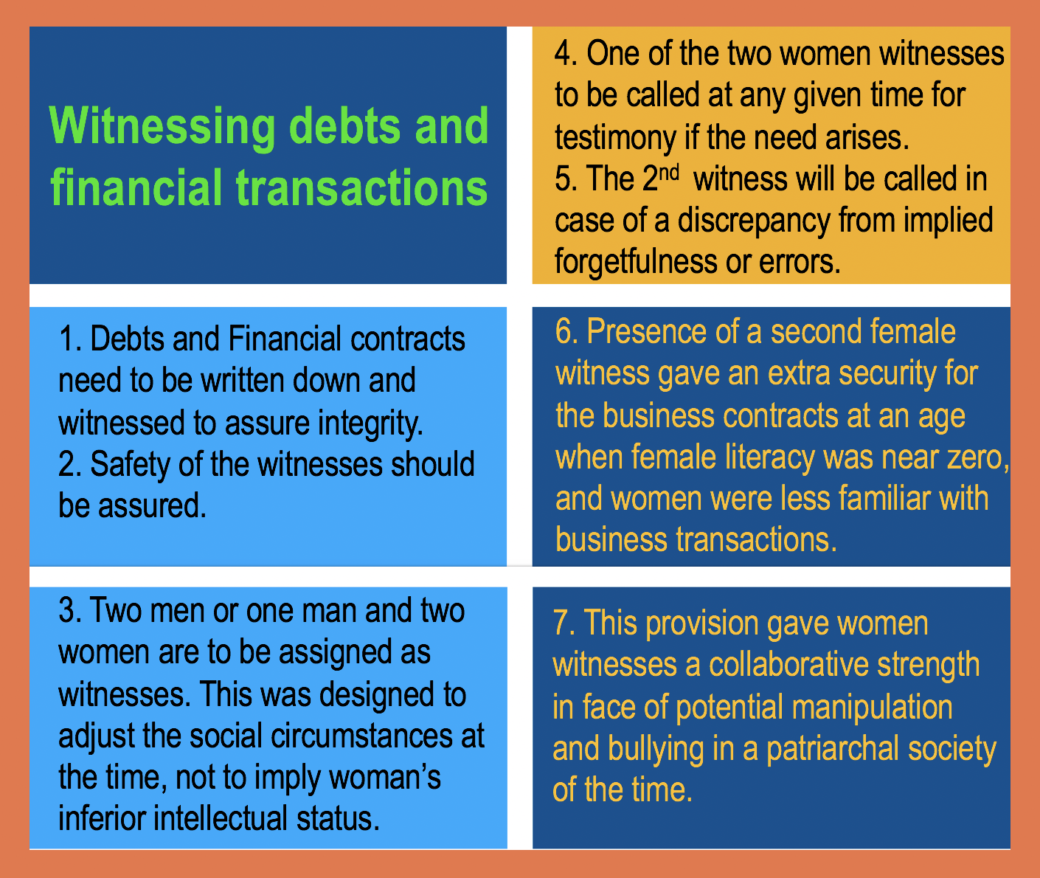
Historical context
The issue of male and female witnesses in the Quran has been a topic for contentious discussions. Does a woman witness merit half of a male witness? Surely, we need to explore the Quranic verses and look through the time to a culture of 1400 years ago to make a balanced judgment of the revelation.
Firstly, It was a time when the female literacy rate was virtually zero. Women were involved primarily with household works and raising children in a male dominant society. Women were less familiar with business and other financial transactions compared to their male counterparts. Financial transactions were mostly a men’s domain. The Quranic verses relating to witnessing financial transactions or other contracts need to be examined in these historical and cultural contexts.
Are women allowed to be a full witness in the Quran?
It is fair to say that the primary purpose of witnessing a financial deal is to protect the financial contract’s integrity. Proper documentation and witnesses are vital to prevent future confusion and conflicts. Does the Quran imply that women are inherently unable to be a full witness? Does the Quran consider women to be unable to judge objectively? The answer is an emphatic “no.” The Quran discredits these assertions and clarifies its position on this issue.
1. Examples where the gender of a witness does not play a role
The examples of gender-neutral testimony include: (a) While preparing a will for an inheritance, the Quran made no distinction between male and female witnesses (Quran 5: 106). (b) In witnessing the divorce process, there is no distinction between male and female witnesses. (Quran, 65:2).
2. When a woman’s testimony nullifies a man’s testimony
In the case of the wife’s self-defense against suspected infidelity, the wife’s testimony supersedes the husbands’ testimony (Quran 24:6-9)
Illustration (a)

The Quran 24:6-9
“As for those who accuse their own wives of adultery, but have no other witnesses, let each one four times call God to witness that he is telling the truth, and, the fifth time, call God to reject him if he is lying. Punishment shall be averted from his wife if she, in turn, four times, calls God to witness that her husband is lying – and, the fifth time, calls God to reject her if he is telling the truth…”

The Quran 2:282
“…You who believe, when you contract a debt for a stated term, put it down in writing: have a scribe write it down justly between you. No scribe should refuse to write: let him write as God has taught him, let the debtor dictate, and let him fear God, his Lord, and not diminish [the debt] at all. If the debtor is feeble-minded, weak, or unable to dictate, let his guardian dictate justly. Call in two men as witnesses. If two men are not there, then call one man and two women out of those you approve as witnesses, so that if one of the two women should forget, the other can remind her”………….”Have witnesses present whenever you trade with one another, and let no harm be done to either scribe or witness…..”
Illustration (b)

3. Witnessing a business transaction
The primary goal of a business contract is to ensure the uprightness of the agreement. The central consideration of the Quranic verse 2:282 can be understood as (a) to keep the integrity of the financial transaction, and (b) to protect the witnesses from potential manipulation by bullying or threats in a patriarchal primitive society (Quran 2:282 “….. and let no harm be done to either scribe or witness…..”).
In verse 2:282, the Quran approached its objectives by proposing two male witnesses or one male and two female witnesses to witness financial contracts. How does this proposition help the Quranic objectives of keeping it fair and not being discriminatory to the women witnesses?
Consideration given to a specific cultural context
In “The Study Quran” (published by Harper One), a team of Islamic scholars explained the context of this verse: “…Since the woman of the time, as a general rule, would have been inexperienced with the particulars of potentially complex financial arrangements, accepting two women in the place of one man would have been more practical since the purpose of such testimony was to ensure of the proper observance of the particulars of the loan or sale. Considering the social conditions of the time, for women to participate this way at all would have been itself a major change, and to require two of them in such transactions can be understood as providing a measure of protection for them against bullying or manipulation, rather than an indictment of their testimony.”
Source: https://en.wikipedia.org/The_Study_Quran
The historical context of revelation
The Quranic verse 2:282 was revealed in connection with agricultural forward sales practiced in Madinah at the time of the Prophet (Peace be on him). Source: “The Study Quran”, published by Harper One.
Examining the process: 1. A written contract is needed
(a) Scribes are to write down the deal correctly to the best of their ability. (b) Borrowers or borrower’s legal representatives are given preference to describe the contract to the scribes. This recommendation would help the borrower affirm his understanding of the contract and work to remind him of the liabilities he is stepping in.
2. Witnesses need to be assigned
The verse suggests securing two male or one male and two female witnesses in a future dispute.
3. What the verse 2:282 suggests and what it does not
(a) The verse suggests that between two female witnesses, one will actively provide witness. (b) The second female witness is a standby witness, necessary only in case of a presumed forgetfulness or error. (c) The verse does not suggest that both the female witnesses have to give witness to make the witness valid.
4. How do we know that one of the witnesses “forgot” or “erred”?
One will assume an error in witnessing if there is a discrepancy in the testimonies between the male and the female witnesses. In case of such a discrepancy, the verse 2:282 of the Quran suggests that the second woman witness will be asked about her testimony.
Important note 1: Non interference from the male witness
The male witness shall refrain from counseling the female witness to correct or remind her in case of supposed forgetfulness. As the verse suggests, the second female witness will assist her in recollection and reconciling the testimony.
Important note 2: Maintaining the Integrity of the contract
If the 2nd woman witness’s account collaborates with the male witness, then evidently, the first female witness erred or forgot. So the integrity of the contract is saved by the testimony of the second woman.
Important note 3: Collaborative strength for the female witnesses
If the 2nd woman witness suggests that the first woman’s testimony is correct, that will indicate that the male witness might have erred or forgotten. In such a case, the presence of the second woman witness will serve the followings:
(a) Any attempt to unfairly marginalize the female witness’s credibility will be difficult due to the presence of a second female witness.
(b) Presence of a second female witness gave women witnesses a collaborative strength in the face of potential manipulation and bullying in a patriarchal society.
(c) As we mentioned earlier, this provision also provided extra security for the contract at an age when female literacy would be more likely to be near zero, and the women were less familiar with business transactions and related mathematical calculations. https://en.wikipedia.org/wiki/The_Study_Quran
(d) As part of the natural physical process, women have periods in their life when they have pregnancies, monthly menstrual periods, and premenstrual physical syndromes. In premodern societies, women were mostly engaged in household works and caring for little children. Recommending two women as witnesses, the Quran allows women to witnesses additional flexibility for their availability, if needed. One can be a witness in case of a need if the other is not able to.
Note 4: Objective of achieving social justice
With the historical context in mind, we can say that what the Quran proposed for seventh-century Arab society regarding the male and female witnesses for financial transactions was practical. It was also consistent with achieving fairness and justice in society.
Conclusion
Certainly, the appropriate historical and cultural context is important in contemplating the Divine revelations. Allah is well aware of the nature of human beings. He knows their strengths and weaknesses in any cultural setting. He is ever aware of different human civilizational stages as the civilization grew over time.
No pair of shoes fit every foot. Indeed, the type of tools we can use to serve humanity can be different at a different time and in a different culture. Yet, God’s prescribed objectives of justice, fairness, and equality of humanity remain unchanged.
Empowering Women in Islam: Index
(1) Does a female witness merit half the male witness? Discussion on male and female witnesses in the Quran. Follow the link: https://qpeace.net/?p=314 (2) Is it fair that men get double the women’s share of the inheritance? How Does Islam Empower Women? Follow the link: https://qpeace.net/?p=5034 (3) Myths About the Status of Women in Islam. Follow the link: https://qpeace.net/?p=4064

2 Trackbacks / Pingbacks